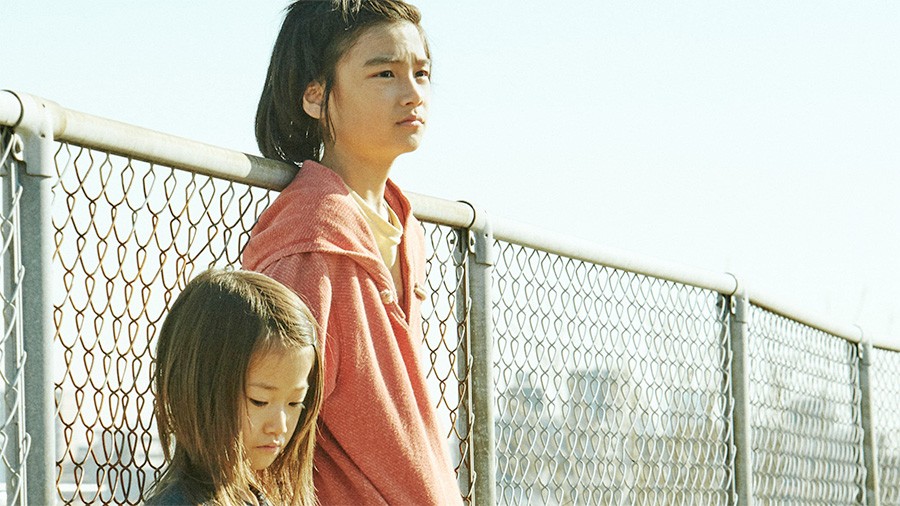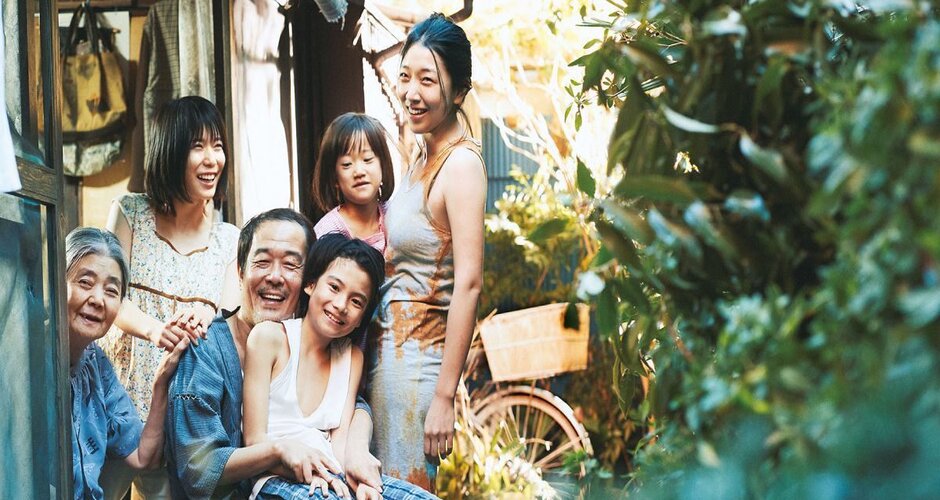I’ve been trying to figure out a way to write about Shoplifters ever since I saw it; searching for an angle or a ‘hot take’ like a shark out for blood. I read a lot of reviews of the film and watched a ton of YouTube video essayists discussing it but I felt like I was coming up empty no matter where I searched. Because the truth is, Shoplifters affected me the way very few films do, hell, the way very few works of art do. How to put into words the immense feeling it invoked? How to describe it’s profound insight and its utterly human and moving look at families and relationships? It’s one of those films where words simply fail. It’s a text so rich and honest, so funny and surprising, so deeply sad and moving that all one can do is gawk at it and applaud. Nevertheless, I shall trudge forward.
Shoplifters is a film from acclaimed Japanese director, Kore-eda Hirokazu, a man with a rather lengthy filmography that I must admit I am largely unfamiliar with. I saw one of his early films, After Life (about people having to choose only one memory from their waking life to take into the great beyond) when it first came out in 1999, didn’t understand it, and moved on. Shoplifters was only on my radar because it was nominated for Best Foreign Language film at the 2019 Oscars and I always try to pay attention to those. I watched it very early on during quarantine—maybe the third or fourth week—without having a clue what it was about or who directed it. It just seemed like a good time to watch a foreign language film that I probably would have put off forever were I not stuck at home for what felt like an eternity.
The story is well told and elegant in its simplicity. The film opens with an older man and a young boy walking into a store. They seem to have some kind of silent code. The man nods at the boy, nearly unperceptively. The boy causally walks past a shelf of goods, waits for the older man to distract an employee, and then piles a series of those goods into his bag. They walk out of the store, giggle a bit at their brilliant heist, and begin the long trek home. One gets the sense that this is a routine for them, as common as going to work in the morning or taking a daily shower. The walk home reveals their economic state. They walk past buildings that are piled on top of each other in areas that might be considered derelict, but this is clearly home for them and they don’t care. It was interesting to watch and see the obvious parallels between this film and Parasite. Both works are about class division and what those underneath the status quo must do to survive. But while Parasite takes a somewhat cynical and angry route to that subject matter (to great effect, Parasite rules), Shoplifters goes down a different road.

The two characters arrive home and we meet the rest of their family. They feel oddly traditional. There is a mother figure, the man’s wife. She scolds the two boys for being late as she cooks dinner. There is a grandmother, who dispenses wisdom as if she was born to do so, and a slightly rebellious teenager (the mom’s sister) who would be right at home in a John Hughes comedy. They argue and bicker the way families do, but without rancor, and then they settle in for a meal made up of stolen goods. There’s a level of warmth to this sequence that is impossible to pin down. It feels as if we are not merely observers but participants.
After dinner, the husband and wife go out for a walk. It’s cold outside and we can feel the chill in the air. They discuss mundane things and we realize that shoplifting is simply a way of life for them, a way to get by. They’re not necessarily pleased by it but, in the words of the oldest cliché, “it is what it is”. As they walk, they come upon the porch of an apartment. There is a little girl sitting on the stoop. She is no more than three years old. She sits with a raggedy blanket around her shoulders as her parents scream at each other inside. Their screams are loud and vitriolic. Our two main characters see the little girl nearly freezing to death and decide to take her back to their apartment for a home cooked (albeit stolen) meal. She follows along without complaint. They tell themselves they will bring her back to her parents tomorrow. But we know this child is here to stay.
And that’s the movie. On the surface, yes, it is about a pair of kidnappers who justify their actions by saying that the little girl is “better off”. As the narrative progresses, we begin to realize that every single relationship is not as it seems. That the grandmother might not be directly connected to anyone by a bloodline. That the sister might just be a lost soul who found some people to let her in. And that the little boy who is so good at shoplifting might have more similarities to the little girl than he or we expect. He forms a concrete bond with that little girl, for they are both from broken worlds, and discovers that having someone whom he can call ‘sister’ is far more valuable than any stolen goods.

To say more would be to give the whole game away so I would like to focus on the film’s two most moving sequences. The first occurs between the husband and the wife. It takes place on one of those hot summer days where it feels like no amount of AC will make any difference. They’re home alone, for once. The kids are out playing, the grandmother is at the market, and the older sister is on a date. The two leaders of this makeshift family sit next to each other and remark that they haven’t had sex in quite some time. The conversation feels jokey, flippant even, as if they are remarking on some comedy sketch they both saw the previous evening. Then they have sex. The movie does not show the act, only the aftermath. It cuts to them lying next to each other, smoking, and enjoying the company of shared love. There’s nothing erotic about the scene, nothing exploitative. It is simply a moment of genuine human connection, rendered with the grace of a classical painter. So many movies are interested in risqué sex scenes. It’s the rare piece of work that is interested in what happens afterward, as people lie together and feel a sense of peace. It is simply beautiful.
The second sequence occurs very late in the film (and is 100% the reason the movie got any Oscar attention) when the entire family goes out for a day at the beach. By this point, the little girl has been with them for quite some time and has begun to develop the ability to vocalize her feelings. The “mother” holds her by the sea as the waves crash in and asks her about her previous family. The little girl tells her that they loved her but beat her constantly. The mother frowns for the slightest of seconds and then tells the child that someone who loves you doesn’t hit you, doesn’t hold you like that. Instead, they hold you like this, and she wraps her arms around the child’s chest. They hold you like this, and she kisses the girl’s forehead. They hold you like this, and she wraps herself so thoroughly around the child that it is hard to tell one apart from the other. The girl laughs and cries and the mother does too. It’s a moment of tenderness so profound that one has to wonder how anyone on set was able to sit through the sequence without crying. What also comes through, and which makes the sequence even more powerful, is that we get the sense that this is not one, but two people dealing with the aftermath of abuse. Yes, the little girl is comforted but the mature woman is comforted more. We learn very little of her past but we can assume it’s not sunshine and roses. As she holds this poor little child close to her heart, we can almost hear her begin to heal.
To say more would be disingenuous. I cannot recommend the movie enough but must add a warning: this is not a strictly upbeat piece of work. Everything is not wrapped up with a nice little bow. Tragedies occur, secrets are revealed, and no character is left off the hook.The final shot is a hopeful one but also open to interpretation. Nevertheless, getting to know these people is beyond rewarding. There’s this horrid stigma that hangs around foreign films like a disease, suggesting they are unknowable and dangerous. Yes, there is a barrier between subtitles and dialogue but that doesn’t mean that this stuff isn’t worth watching. And there are a lot of great foreign films out there that aren’t in the horror or thriller genre. Trust me, you can deal with the subtitles. Because when a woman wraps her arms around a child and tells her that she is loved and beautiful, do you really need subtitles? Doesn’t the action speak for itself? Don’t you know what she means?


GET CHOMPED